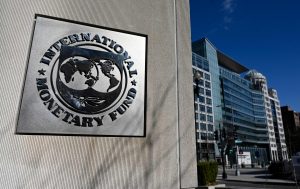Global current account balances, which consist of the overall size of deficits and surpluses across countries, widened significantly for a second consecutive year from 3 percent of global gross domestic product (GDP) in 2020 to 3.5 percent in 2021, and are likely to expand further in 2022, according to the International Monetary Fund (IMF).
The international financial institution attributed the changing current account deficits and surpluses balance to the lingering Covid-19 pandemic and ongoing war in Ukraine which is affecting trade, commodity prices, and financial flows, all of which are dealing a setback to the global economy and are expected to contribute to a further widening this year.
The report explained that global excess balances – the portion not justified by differences in countries’ economic fundamentals, such as demographics, income level and growth potential, and desirable policy settings, could fuel trade tensions and protectionist measures.
This, it noted, would be a setback for the push for greater international economic cooperation and could also increase the risk of disruptive currency and capital flow movements.
Impact of the pandemic on global current account balance in 2021
According to the IMF, the Covid-19 pandemic widened global current account balances, and it’s still having an asymmetric impact on countries, depending on whether they are exporters or importers of tourism and medical goods.
The report recalled that the pandemic and associated lockdowns also shifted consumption to goods from services as people reduced travel and entertainment. This, it noted, also widened global balances as advanced economies with deficits increased goods imports from emerging market economies with surpluses.
“In 2021, we estimate that this shift increased the United States deficit by 0.4 percent of gross domestic product and contributed to an increase of 0.3 percent of GDP in China’s surplus,” the report stated.
In addition, the report found that surplus economies like China also saw increases due to greater shipments of medical goods that often flowed to the United States and other deficit economies. Surging transportation costs were also indicated to have contributed to widening global balances in 2021.
How Ukraine war and monetary tightening is affecting global account balance in 2022
Russia’s February invasion of Ukraine is considered to have exacerbated the surge in energy, food, and other commodity prices, consequently widening global current account balances by raising surpluses for commodity exporters.
The resultant rising inflation has led many central banks to accelerate the withdrawal of monetary stimulus to curb inflationary pressure and drive currency movements.
“Revised expectations about the pace of the US monetary tightening brought about sizeable currency realignment this year, contributing to the projected widening of balances,” IMF noted.
The report further disclosed that capital flows to emerging markets were disrupted so far in 2022 by increased risk aversion triggered by the Russia/Ukraine war, with further outflows amid changing expectations about the increased pace of monetary tightening in advanced economies.
As a result, cumulative outflows from emerging markets have been very large, about $50 billion, with a magnitude that’s similar to outflows during March 2020 albeit at a slower pace.
In its outlook for 2023 and beyond, the IMF projected a steady decline of global current account balances as pandemic and war impacts moderate, though this expectation is subject to considerable uncertainty.
The report warned that global current account balances could continue to widen should fiscal consolidation in current account deficit countries take longer than expected. It added that the stronger dollar could widen the US current account deficit and increase global current account balances.
Other factors projected to likely widen the balances in the long term include a prolonged war that keeps commodity prices elevated for longer, the varying degrees of central bank interest-rate increases, and greater geopolitical tension causing economic fragmentation, disrupting supply chains, and potentially triggering a re-organisation of the international monetary system.
“A more fragmented trade system could either increase or decrease global balances, depending on how trade blocs are reconfigured. Either way, though, it would reduce technology transfers, and decrease the potential for export-led growth in low income countries and thus unambiguously erode welfare gains from globalisation,” the report projected.
Policy priorities to address widening global account balance
According to the report, the war in Ukraine has exacerbated existing trade-offs for policymakers, including between fighting inflation and safeguarding economic recovery and between providing support to those affected and rebuilding fiscal buffers.
The report recommended multilateral cooperation as a major way of dealing with the policy challenges generated by the pandemic and the war, including to tackle the humanitarian crisis.
Based on the fact that policies to promote external rebalancing are subjected to individual economies’ positions and needs, economies with larger-than-warranted current account deficits that reflect large fiscal shortfalls, such as the United States, were advised to reduce government deficits with a combination of higher revenue and lower spending.
The IMF further noted that rebalancing is a different proposition for countries with excessive surpluses, such as Germany and the Netherlands. According to the report, the surpluses can be reduced by intensifying reforms that encourage public and private investment and discourage excessive private saving, including by expanding social safety nets in some emerging markets.









Good leadership as foundation for Nigeria’s sound fintech development